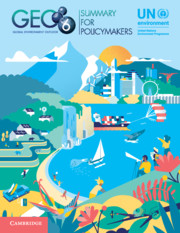1 - What is the Global Environment Outlook?
Published online by Cambridge University Press: 31 May 2019
Summary
The Global Environment Outlook (GEO) is the result of a consultative and participatory process to prepare an independent assessment of the state of the environment, the effectiveness of the policy response in addressing environmental challenges and the possible pathways to achieving various internationally agreed environmental goals. The GEO is a series of studies that inform environmental decision-making for Governments and other stakeholders. ﹛1.1﹜
The sixth Global Environment Outlook (GEO-6), under the theme “Healthy Planet, Healthy People”, aims to provide a sound, evidence-based source of environmental information to help policymakers and all of society to achieve the environmental dimension of the 2030 Agenda for Sustainable Development and internationally agreed environmental goals, and to implement the multilateral environmental agreements. It does so by assessing recent scientific information and data, analysing current and past environmental policies and identifying future options to achieve sustainable development by 2050. ﹛1.1﹜
Since the first edition of the Global Environment Outlook (GEO in 1997, there have been many examples of environmental improvement, especially where problems have been wellidentified, manageable, and where regulatory and technological solutions have been readily available. Much more can be achieved in that regard through more effective implementation of existing policies. ﹛Chapters 12 to 17﹜
Nevertheless, the overall condition of the global environment has continued to deteriorate since the first edition of GEO, despite environmental policy efforts across all countries and regions. Environmental policy efforts are being hindered by a variety of factors, in particular unsustainable production and consumption patterns in most countries and climate change. GEO-6 concludes that unsustainable human activities globally have degraded the Earth's ecosystems, endangering the ecological foundations of society. ﹛Chapters 4 to 9﹜
Urgent action at an unprecedented scale is necessary to arrest and reverse this situation, thereby protecting human and environmental health and maintaining the current and future integrity of global ecosystems. Key actions include reducing land degradation, biodiversity loss, and air, land and water pollution; improving water management and resource management; climate change mitigation and adaptation; resource efficiency; addressing decarbonization, decoupling and detoxification; and the prevention and management of risk and disasters. Those all require more ambitious and effective policies, including sustainable consumption and production, greater resource efficiency and improved resource management, integrated ecosystem management, and integrated waste management and prevention.1 ﹛Chapter 22﹜
- Type
- Chapter
- Information
- Publisher: Cambridge University PressPrint publication year: 2019
- Creative Commons
- This content is Open Access and distributed under the terms of the Creative Commons Attribution licence CC-BY-NC-ND 4.0 https://creativecommons.org/cclicenses/
- 7
- Cited by



